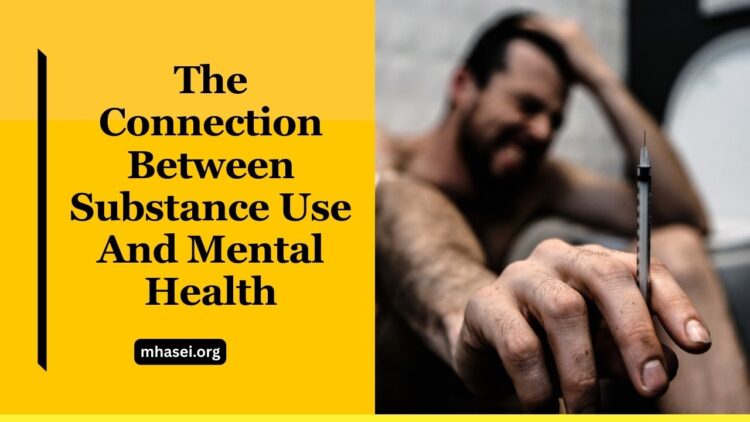The relationship between substance use and mental health is one of the most pressing health issues of our time. People struggling with depression, anxiety, PTSD, or bipolar disorder are at higher risk of developing a substance use disorder (SUD).
Conversely, heavy or long-term use of alcohol or drugs can worsen or trigger mental health conditions. With millions of people worldwide facing these dual challenges, understanding the connection is vital for prevention, treatment, and long-term recovery.
Why Substance Use and Mental Health Are Linked
The connection between the two is both biological and social:
- Shared brain chemistry – Changes in stress and reward systems make people more vulnerable to both addiction and mental illness.
- Self-medication – Many turn to alcohol, cannabis, or opioids to numb symptoms such as anxiety, insomnia, or trauma.
- Trauma and stress – Adverse childhood experiences, violence, or chronic stress increase the likelihood of both substance misuse and poor mental health.
- Substance-specific effects – For example, high-THC cannabis use is associated with psychosis risk, while long-term alcohol misuse deepens depression and anxiety.
The Latest Figures (2025)
Recent statistics highlight the urgency of this issue:
- Alcohol contributes to millions of deaths each year worldwide and remains one of the most harmful substances for both mental and physical health.
- Drug-related deaths still account for hundreds of thousands of lives lost annually, though new treatment and harm reduction strategies are showing signs of progress.
- In the U.S., millions of adults are living with both a mental health condition and a substance use disorder. Alarmingly, a large portion of them receive no treatment for either, and only a small percentage receive care for both.
Key Facts at a Glance
| Category | Figure (Latest Estimates) | Impact |
|---|---|---|
| Global alcohol-related deaths | ~2.6 million annually | Major contributor to depression, anxiety, and suicide risk |
| Global drug-related deaths | ~600,000 annually | Linked to overdose, mental illness, and social decline |
| U.S. adults with both SUD + mental illness | ~20 million+ | Highlights urgent need for integrated care |
| Adults with serious mental illness + SUD | ~7 million | Indicates severity and complexity of co-occurring disorders |
| Care gap | 1 in 3 receive no treatment | Shows barriers and lack of integrated services |
Substance-Specific Mental Health Risks
- Alcohol: Worsens depression, anxiety, and sleep problems. Heavy drinking increases suicide risk and interacts dangerously with psychiatric medications.
- Cannabis: High-potency, frequent use is linked to greater risk of psychosis, particularly in younger adults.
- Opioids: Strongly associated with depression and high overdose risk. Medications such as buprenorphine and methadone can reduce these risks significantly.
- Stimulants (e.g., cocaine, meth): Can cause paranoia, anxiety, and depressive crashes. Combined use with opioids raises overdose risk dramatically.
What Works: Evidence-Based Approaches
1. Integrated Care
Treating mental health conditions and substance use disorders together produces far better results than treating them separately. Integrated teams and co-located services improve engagement and recovery outcomes.
2. Medications for Addiction
Medications such as buprenorphine and methadone for opioid use disorder save lives, reduce withdrawal symptoms, and stabilize mental health. They are proven to cut mortality rates and improve quality of life.
3. Therapies and Counseling
Approaches like cognitive behavioral therapy (CBT), trauma-informed care, and contingency management address both substance use and mental health symptoms.
4. Harm Reduction Strategies
Expanding access to naloxone, safe-use supplies, and testing kits prevents overdose deaths while supporting people until they are ready for treatment.
5. Prevention and Early Intervention
Screening for depression, anxiety, and substance misuse in primary care and schools helps identify risks early. Teaching healthier coping strategies reduces reliance on substances.
The Role of Workplaces and Communities
- Employers can provide confidential counseling services, promote stress management programs, and train managers to recognize warning signs.
- Communities can reduce stigma, expand peer support groups, and ensure that treatment options are accessible and affordable.
- Public health campaigns should emphasize that mental health care and substance use care are inseparable.
The connection between substance use and mental health is undeniable and deeply intertwined. Millions live with co-occurring conditions, yet far too many go untreated.
The good news is that effective treatments exist—from integrated care and proven medications to therapy and harm reduction.
By addressing both issues together, individuals, families, and communities can reduce suffering, save lives, and build healthier futures.
FAQs
Why do people with mental health issues often turn to substances?
Many use substances to self-medicate symptoms like anxiety, stress, or trauma. Unfortunately, this worsens long-term mental health.
Can someone recover fully from both conditions?
Yes. With integrated treatment, medications, and therapy, many people achieve long-term recovery and live healthy, fulfilling lives.
What’s the best first step if someone struggles with both?
Seeking help from a healthcare provider who specializes in co-occurring disorders is the best first step. Integrated care is most effective.




